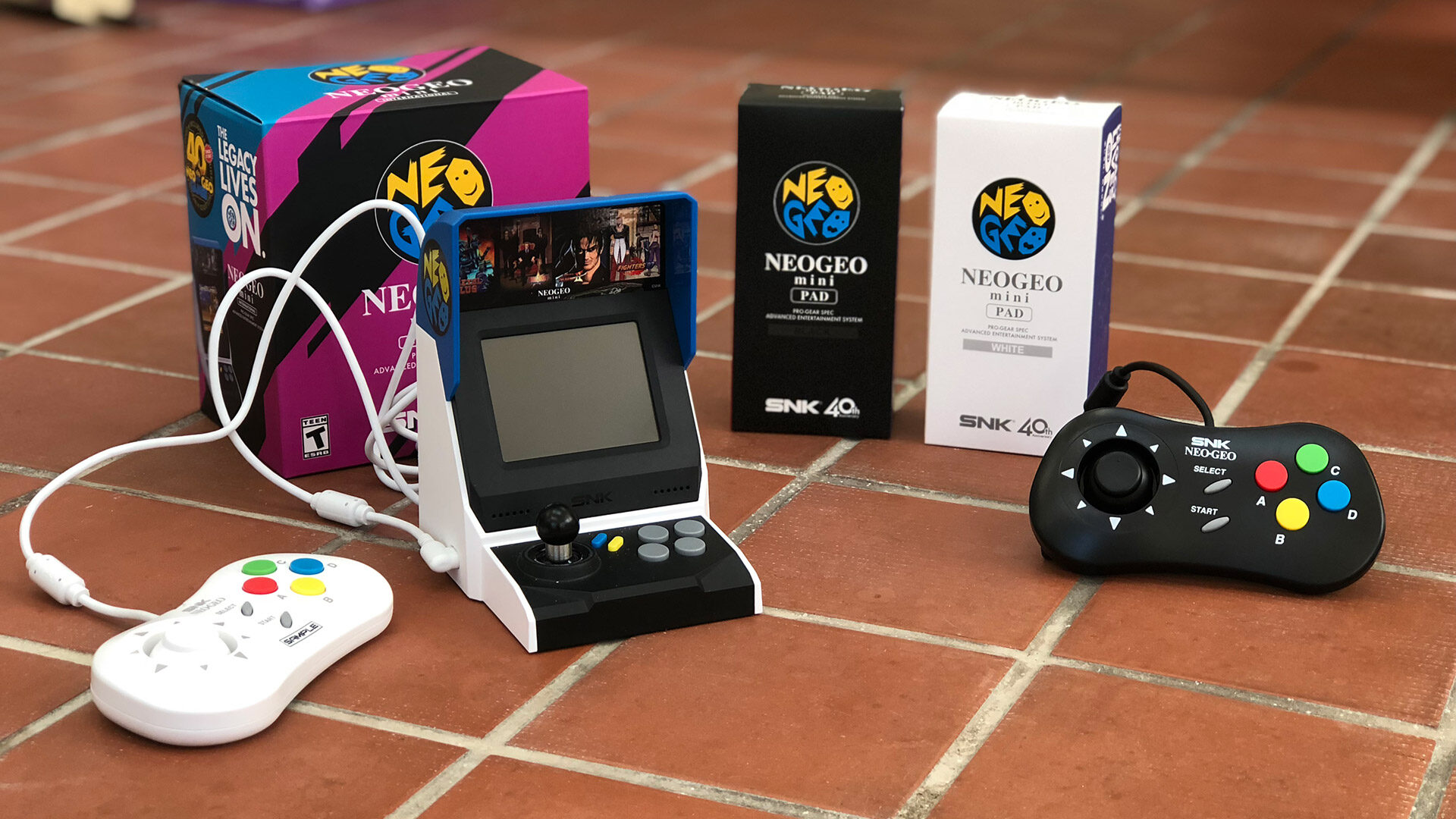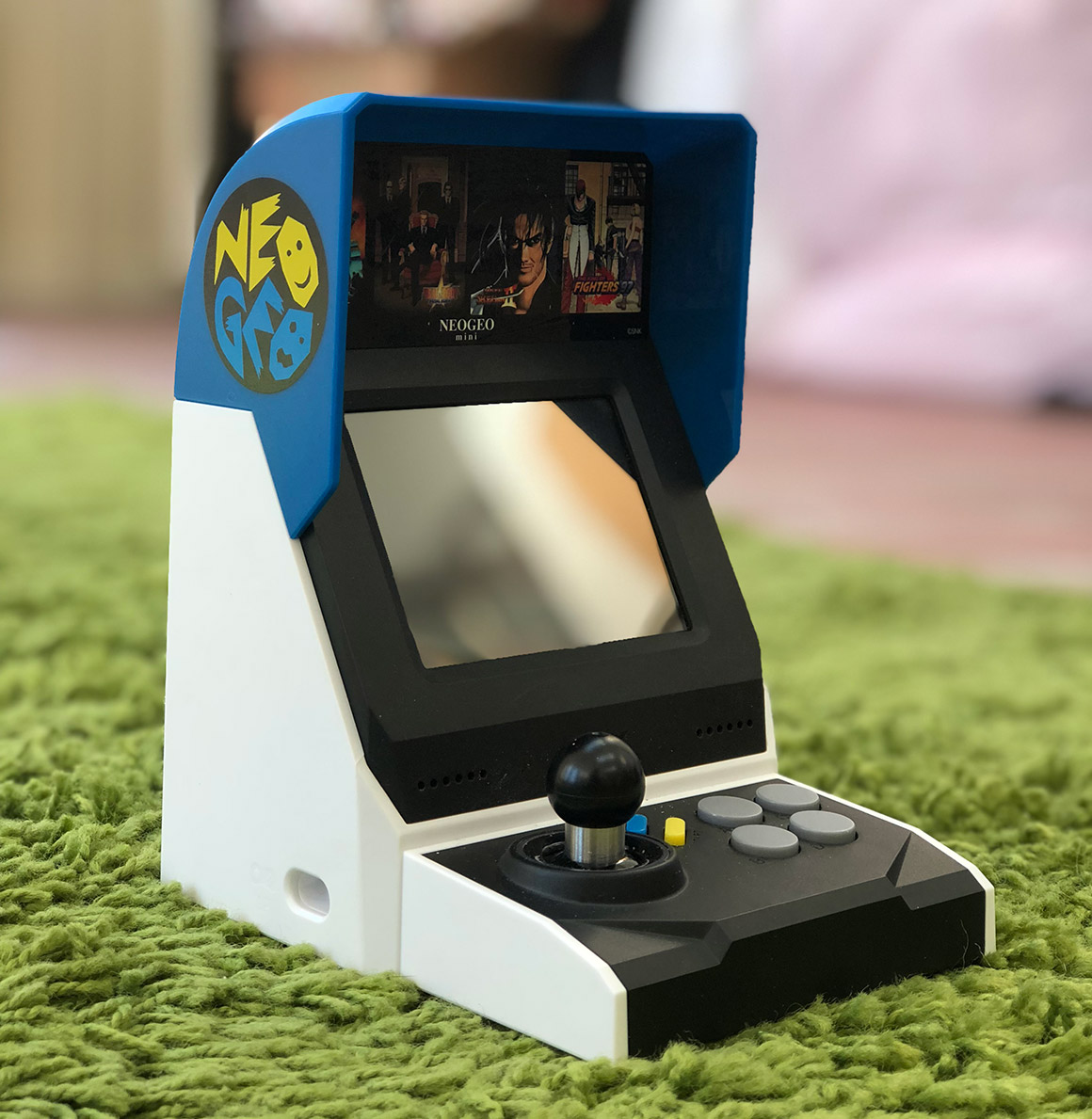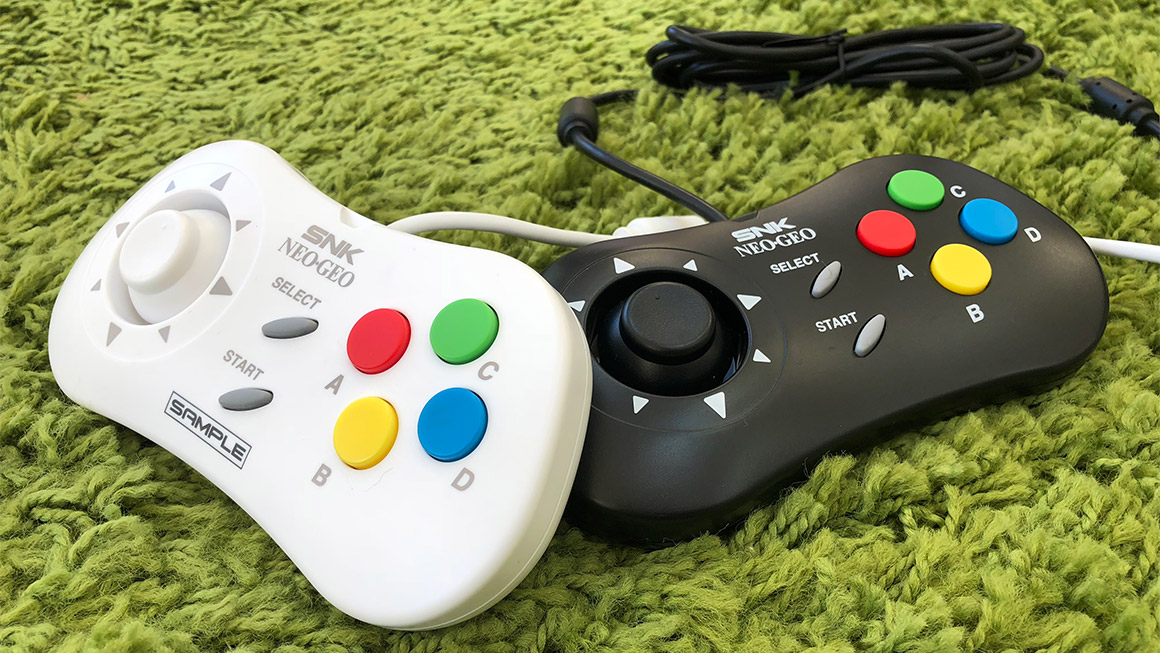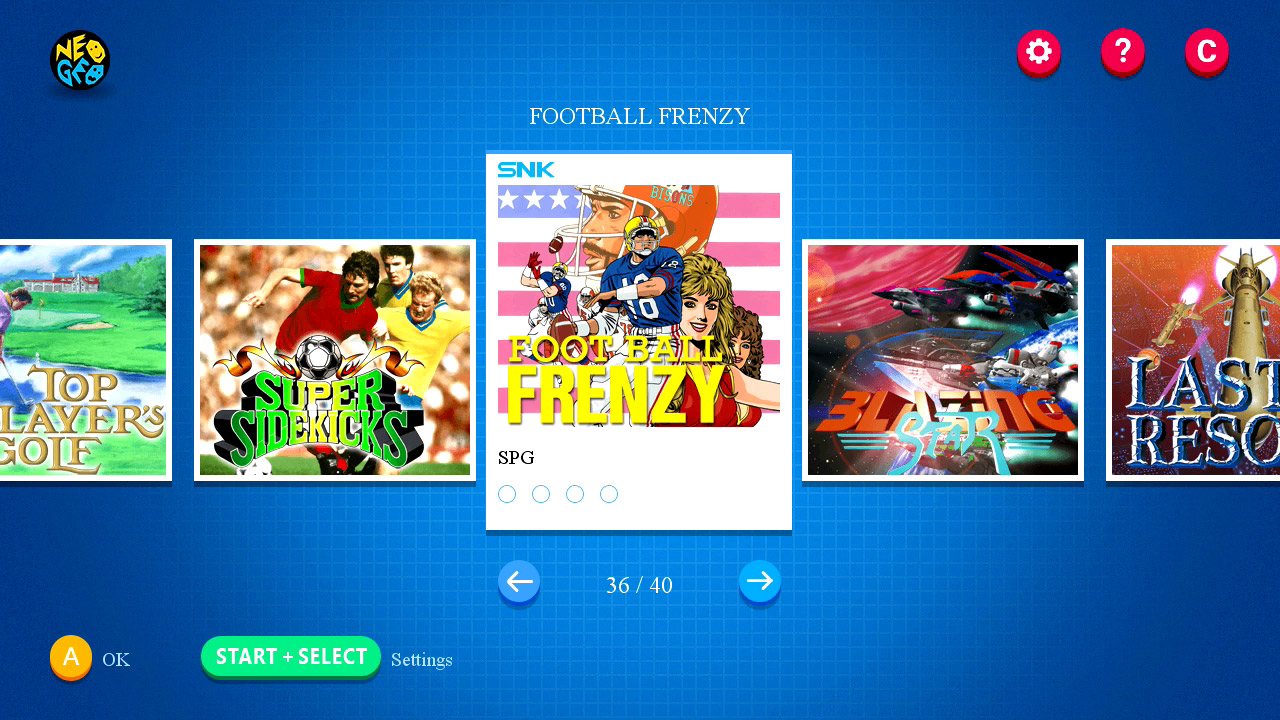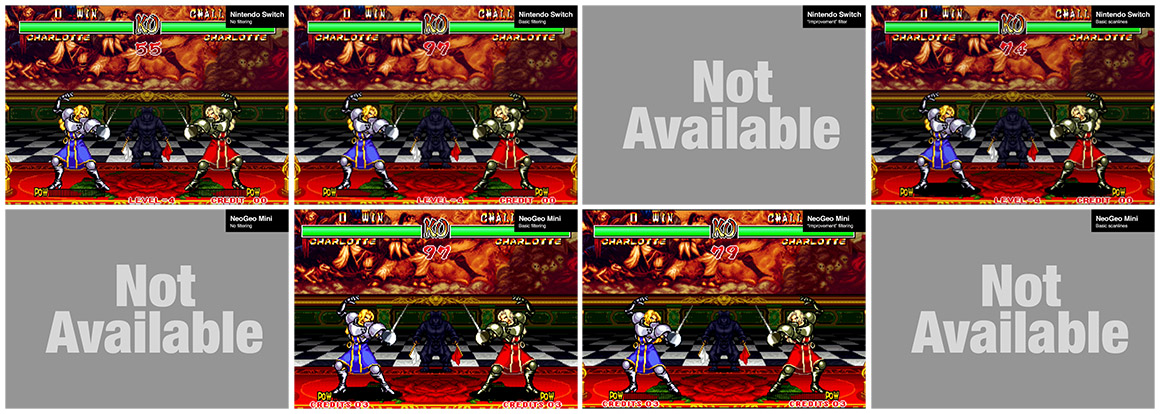NeoGeo Mini Review
It used to be that all-in-one video game “systems” were cheap, disposable products released in the hopes of making a few quick bucks off of nostalgia. Then, in late 2016, Nintendo released the NES Classic Edition, showing the world what you could do when you actually care about the product you’re making. Since then, there’s been a push for giving consumers higher-quality plug-and-play options, and one company to throw its hat into the ring is SNK. If there’s any company that’s made a business out of selling and reselling its classic titles, it’s SNK, so as a longtime fan, I wasn’t at all surprised to see it offer up a product to join the ranks of the SNES Classic Edition, The C64 Mini, and the upcoming Mega Drive Mini and PlayStation Classic.
So how did their attempt turn out?
Overall design
SNK created the NeoGeo Mini’s striking blue, white, and red design (altered slightly for our “international” version) to represent the SC14-2/4 arcade cabinets that it used in Japan. On that level, it’s a neat nod to both the legacy of SNK’s NeoGeo platform, and the company’s big shift to the arcade market during that era.
Let’s be honest though: this design will hold little nostalgia for a whole lot of fans. In the West (or at least North America), there are few arcade cabinets more iconic than the red NeoGeo units we got, so something like this doesn’t even register as being SNK-related without a history lesson. Even in Japan, I’ve never personally seen this model in use, with every NeoGeo game I’ve ever played being in a more traditional “candy” cabinet.
Really, though, when you tell me that SNK is going to be making its own all-in-one piece of hardware, I instantly expect a miniature reproduction of the NeoGeo home console. Sure, it’s likely that people have experienced these games in the arcade instead of on the expensive home system, but that console is still incredibly iconic to a whole lot of gamers. Also—and I know this is being a bit pedantic—all of the games on the NeoGeo Mini are the AES (home) versions, not the MVS (arcade) versions. While that was the right choice to make (excluding one hitch I’ll mention in a bit), as the AES versions provide more gameplay modes and options, they would have felt even more “right” on a system designed to replicate the home console.
Finally, some peculiar decisions were made with the buttons on both the system itself and the optional NeoGeo Mini Pad controllers. When put into a 2×2 layout, NeoGeo buttons typically go “C D, A B” in terms of order. Here, for no clear reason, that order changed to “A C, B D”. Well, there is one potential reason: that layout does work better for The King of Fighters, which is by far SNK’s most popular fighting game brand at this point. Still, it’s a weird change, as is the loss of the trademark button colors on the international version of the NeoGeo Mini.
Hardware quality
So, I could argue why I’d rather have had a unit that replicates the home console, but there’s a pretty clear reason why SNK might have chosen to go this route instead: to stand out. Having a mini arcade cabinet, complete with screen, that can sit on your desk definitely sets the system apart from the plug-and-play crowd—even if it does then risk grouping the NeoGeo Mini together with all of the cheap mini arcade cabinet products that have also flooded the market in recent years.
I was afraid the NeoGeo Mini might be on the same quality level as those other options, but this is the area where I came away the most surprised. Sure, the unit itself is small, but it’s way more playable than I assumed it’d be. The buttons are a good size and feel satisfyingly clicky, and the stick actually works well enough to play fighters on it (beyond just button mashing). Now, I want to be clear: You need to have realistic expectations for how playing games directly on the NeoGeo Mini will feel, and it isn’t suited for more serious or longer play sessions. For something to have sitting there when you want to take a break or need a distraction, however, it’ll do the job. That’s also helped by the unit’s screen, which again defied my expectations. Games look incredibly crisp and clear on the NeoGeo Mini’s display, doing justice to the beauty of SNK’s sprite work.
There is, however, one giant asterisk on all of this that may or may not ruin the idea of the NeoGeo Mini for you: It has no battery. If you don’t have the system plugged into a power source of some sort, you won’t be playing games on it. I’m not sure it’s a total dealbreaker for me, but when you put the effort into making a device that can completely stand on its own without needing any external hardware, not being able to just pick it up and play wherever you want hinders that goal.
Then we come to the NeoGeo Mini Pads—and oh boy. On the list of “greatest fighting game controllers of all time,” the NeoGeo CD controller is easily in the top three. Unfortunately, while this recreation has the look of the original, it definitely doesn’t have the feel. For the NeoGeo CD controller, a system of four microswitches read directional inputs, similar to what you’d find in actual arcade machines. That made pushing different directions feel both reliable and recognizable, all accompanied by an oh-so-satisfying clicking noise. Here, on the NeoGeo Mini Pads, an analog stick tries to play the same part, but it just can’t do the same job. There’s no solid sense of pressing a particular direction, so even when navigating the main menu, I constantly had to deal with thinking I’d pushed one way but the system reading another.
If you want to play the NeoGeo Mini on a television, or if you want to do any sort of 2-player gaming, you’re going to need to use the NeoGeo Mini Pads, and they’re an awful recreation of a legendary controller—not to mention a disappointing input device period. To be fair, though, they’re also not unusable. If you’re the type of person who has gotten used to using analog sticks for 2D games, they’re okayfor a lot of the included games here. They can even work for fighting games, but only if you put more mental energy into performing your inputs than you should have to. Being simply okay is such a shame, if for no other reason than having a new batch of good-quality NeoGeo CD pads that support USB would have been very welcome.
Oh, and I should warn you that the NeoGeo Mini requires an HDMI cable with a mini plug on one end, and doesn’t come with such a cable included. So, that’ll be an extra purchase you’ll need to make if you’re hoping to play on a television. (I wouldn’t have even had one on hand had such a cable not been included with the review unit I was sent.)
Game library
Probably the easiest thing to get right about a NeoGeo Mini is its library of included games, and I actually agree with most of the decisions made here.
To recap, the NeoGeo Mini includes:
- Fighters: The King of Fighters ‘95/’97/’98/2000/’02, Fatal Fury Special, Real Bout Fatal Fury, Garou: Mark of the Wolves, Samurai Shodown II/IV/V Special, Art of Fighting, The Last Blade 2, World Heroes Perfect, Kizuna Encounter, Ninja Masters
- Action: Metal Slug 1/2/3/X/4/5, Magician Lord, King of the Monsters 1/2, Shock Troopers 1/2nd Squad, Blue’s Journey, Crossed Swords
- Beat ‘em Up: Sengoku 3, Robo Army, Mutation Nation
- Sports: 3 Count Bout, Top Player’s Golf, Super Sidekicks, Football Frenzy
- Shooter: Last Resort, Blazing Star, Ghost Pilots
- Puzzle: Puzzled
I’ve seen a few people asking why you need that many inclusions from the same franchises, but longtime fans know that there are subtle to major differences between games that make having multiple series representations a necessity. So, for me, it’s more that I’d have swapped out a few of the choices. How do you pick Top Player’s Golf over the far superior Neo Turf Masters? Or give us only one Art of Fighting and not make it Art of Fighting 3? Then there are some notable omissions, from the criminally missing Baseball Stars 2 (or at least 2020), to no racing game when there are a number to choose from, to absent classics like League Bowling and NAM-1975, to missed opportunities to give the unit a bit more variety/niche credit with Twinkle Star Sprites, Magical Drop, or Puzzle Bobble. There’s then a more complicated issue with the included library: our international version of the NeoGeo Mini runs the censored US home versions of games. So, get use to things like green blood when playing Samurai Shodown II in English, and the loss of Mai’s trademark bounce in The King of Fighters ’95.
Still, it’s a good library to choose from, especially if you’re trying to present a proper representation of what the NeoGeo was during its life. And, thankfully, those included games also play well. NeoGeo emulation seems to always have the chance of turning out bad, but in my time with the NeoGeo Mini, the best thing I can say is that I have very little to say. I didn’t notice anything wrong in the way of input lag, visual glitches, slowdown, sound issues, or otherwise—and that’s how it should be.
Wow do I have something to say about the NeoGeo Mini’s visual output, though. When connecting an HDMI cable to output the action to a television, the system applies a smoothing filter to games that looks pretty bad on any size screen. Even worse, the only option you’re given is an “image quality optimization” toggle, which then applies a deeper level of smoothing to rough edges. Want to add scanlines, or get rid of the filtering period? Too bad. Even if you’re someone who tends to like this kind of visual filtering on older 2D games, I’m not certain you’ll be happy with the version implemented here. Meanwhile, if you’re like me and want nothing but clear, crisp pixels, then the NeoGeo Mini’s TV output is awful.
For comparison’s sake, I captured the video out from both the NeoGeo Mini and the Nintendo Switch, and put together the below image. For a more fair comparison, I set the Switch to output at 720p, as that’s the default resolution of the NeoGeo Mini. Be warned: It’s a 4MB PNG file.
Interface
Finally, I want to touch real quick on the NeoGeo Mini’s user interface. Here, I have no huge complaints: the main menu does what it needs to do, there’s only a few seconds of initial loading for each game and then nothing, you can get to the in-game menu by pressing Start + Select together at any time, and every game has four save state slots. However, while there’s not anything wrong on a technical or usability level, it all seems so low effort. There’s nothing that feels trademark NeoGeo or SNK, instead coming off like an experience like you’d expect to find on some cheap knock-off hardware based around stolen ROM files. For an official product celebrating SNK’s 40th anniversary, you’d think at least some care would go into the presentation.
Overall
If we lived in a world where there were few options for going back to the classic NeoGeo library, the NeoGeo Mini would be a far more attractive product for the void that it was filling. We do not, however, live in that world. I’m not sure any single retro system’s catalog has been more readily available than that of the NeoGeo, and we’re even in the middle of Hamster’s fantastic efforts to bring the full extent of those games to a wide variety of platforms.
I mention that because, if you’re looking to experience (or re-experience) SNK’s 24-bit offerings on the big screen, then sadly I think the $110 it costs for a NeoGeo Mini would be far better spent on picking up a batch of Hamster’s releases on the PlayStation 4, Xbox One, or Switch. If a patch for the NeoGeo Mini were to come out and provide more image quality options, I’d soften my stance on that—but not only do I not expect that to happen, it also wouldn’t fix the glaring issues with the NeoGeo Mini Pads. On the other hand, if you’re just wanting a unique SNK collectible that can sit on your desk and provide random sessions of entertainment, it legitimately is neat in a gimmicky sort of way. The NeoGeo Mini is the epitome of the kind of thing you’d love to have, but aren’t really sure you actually need—as much as I wish it hadn’t turned out that way.
NeoGeo Mini
Summary: Being a NeoGeo fan means bracing for constant disappointment, and SNK’s attempt to make its own all-in-one system continues that proud tradition. While the NeoGeo Mini is an interesting—and far more functional than expected—collectible great at adorning a desk or providing brief distractions, it fails at being the more versatile device that it attempts to be.
Score: -
NeoGeo Mini was reviewed using review code, physical copies, or hardware provided by SNK Corporation. Scores are graded on a scale of E (Bad) to S (Special) in homage to Japanese video game grading scales, with the understanding that an S still does not denote a "perfect" score. Scores may have been adjusted from the original source to better fit my personal scale.
